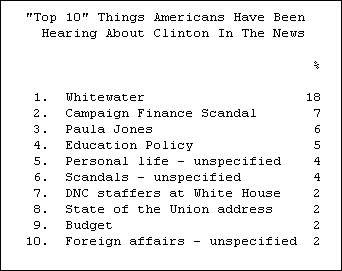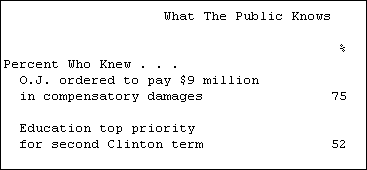Survey Findings
Despite the new spirit of bipartisanship in Washington and the sense of optimism inside the beltway that a budget agreement may finally be at hand, the American public is extremely bearish about the prospects for a balanced budget. Just 28% believe President Clinton and the GOP Congressional leaders will be able to reach a budget agreement this year. An even smaller number (9%) think that such an agreement would actually result in a balanced budget five years down the road.
The public’s lack of confidence in its political leaders’ ability to balance the budget is matched by its lack of personal enthusiasm for it. While most (60%) think balancing the budget should be a top national priority1, only 33% said they and their families would be better off if the budget were actually balanced. As many as one-in-five (19%) said they would be worse off. A year ago, people were slightly more upbeat about their own prospects when 40% of respondents to a Pew survey thought they would be better off in five years if the budget were balanced.

Credit for a balanced budget agreement, should one be reached, would be divided about equally between Clinton and Republican Congressional leaders, with Republicans enjoying a slight edge (39% vs. 33% for Clinton). If a budget deal had been achieved a year ago, the Republicans would have received much more of the credit. At that time, 47% of the public said GOP leaders would deserve the credit if an agreement was reached, vs. 31% for Clinton. Giving the GOP credit has fallen off most among white men, southerners and Catholics.
Men more than women think a balanced budget would have a positive impact on their finances (39% vs. 27%). Middle-aged Americans (30-49 year olds) are more likely to think they would benefit from a balanced federal budget than their younger and older counterparts (39% vs. 30% of those under 30 and 28% of those over 50). Republicans, while less hopeful about the prospects for a budget agreement, are more apt to see the potential for personal financial gain from a balanced budget than are Democrats (41% vs. 31%). Nonetheless, Republican enthusiasm for a balanced budget has fallen off significantly since last year, when a majority thought balance would have a positive effect on them personally.
Compromise?
The American public wants party leaders to “work with the opposition” to prevent gridlock in Washington. Six-in-ten Democrats and nearly as many Republicans (57%) would prefer to see their party leaders in Washington work with the other party to get things done, even if it means disappointing some of their own supporters. Independents are even more in favor of compromise and conciliation.
On an issue by issue basis, however, this spirit of bipartisanship is less clear. The public divides largely along party lines on such contentious issues as the federal budget, reform of the Medicare system, the environment and abortion. And there is a real reluctance on the part of many Americans to compromise their positions on some of these specific issues — particularly those that hit close to home.
The public splits evenly over which party’s position on the federal budget it favors. Traditional Democratic constituencies, such as women, minorities and those with low levels of income and education, said the Democratic Party’s position comes closer to their own. Men, whites and affluent respondents favor the Republican Party’s position.

The budget is an issue on which a bipartisan approach would be acceptable to most Americans. A strong majority (64%) of those who express a preference for one party’s position over the other’s say their preferred party should compromise so that the two parties could reach some agreement. Only 33% believe their party should stick to its position.

Republicans are about as likely as Democrats to say their party should compromise on the budget issue (56% vs. 61%). Independents are even more inclined toward bipartisan solutions (73%). One group particularly resistant to compromise was Evangelical Republicans, 46% said their party should stick to its position even if it means no progress is made.
The public is less willing to compromise on the issue of Medicare reform. On this issue, more Americans align themselves with the Democratic Party’s position than with the Republican’s (42% vs. 33%). Just over half (55%) said their chosen party should compromise on this issue to reach some agreement, but fully 41% said their party should stick to its position. Not surprisingly, senior citizens — who would be most immediately affected by changes in the Medicare system — were less open to compromise (45% vs. 57% of those under 65). Republicans were slightly more inclined to compromise than Democrats (55% vs. 49%).
Americans are similarly ambivalent about compromise on the environment. Here Democrats enjoy a clear advantage over Republicans. Some 44% of the public align themselves with the Democratic Party’s position on the environment, compared to 27% who choose the Republicans. More than four-in-ten respondents said their party should stick to its position on this issue, 54% said their party should compromise.
On abortion the public is clearly opposed to bipartisan compromise. More respondents favored the Democrats’ position on this divisive and emotional issue than the Republicans’ (40% vs. 31%). Among those who favored either position, only 30% said the parties should compromise, while fully 64% said the parties should stick to their positions. Women are slightly more resolute on this issue than men.
Scandal Proof?
Clinton continues to get record high marks from the public for his job performance despite the fact that most of what people have been hearing about the President and his administration lately has been negative. When asked to recall anything they had heard about the President in the news recently, most respondents volunteered one or more of the scandal-related stories which have dominated newspapers and news broadcasts in recent weeks and months.

Whitewater-related stories were most often mentioned, followed by the campaign finance scandal involving Democratic National Committee fundraising efforts for Clinton’s reelection campaign and the Paula Jones sexual harassment case. The only domestic policy issues to make the public’s top ten list were education and the budget debate in Washington.
With such high approval ratings the public wants the President, not the Congress, to set the national agenda. By a 48% vs. 29% margin, Pew respondents thought Clinton rather than the GOP leadership should take the lead in solving the nation’s problems. In March of 1995, during the historic first 100 days of the 104th Congress, the public was evenly split on this question — 40% Clinton, 40% GOP.
The President’s only loss these days with the public was to the verdict in the O.J. Simpson civil trial. In a nationwide Pew survey, conducted shortly after the near simultaneous airing of the State of the Union Address and the news of O.J.’s fate, many more Americans (75%) correctly identified the amount of compensatory damages Simpson was ordered to pay than knew Clinton made education his top priority issue for the next four years.

The verdict in the O.J. Simpson case was the most closely followed story of the month. About one third of Americans (30%) followed this story very closely and another 30% followed it fairly closely. More blacks than whites followed the O.J. story (36% vs. 29% followed it very closely). Three major Washington stories — the DNC fundraising scandal, the budget debate and the debate over the future of Medicare — attracted the attention of about one-in-five Americans. Interest in stories about Social Security reform fell off somewhat (to 23%) since last month when nearly 30% followed the issue very closely.
Older Americans (those 50 and over) continue to follow stories about Social Security and Medicare much more closely than their younger counterparts. Nearly one third (32%) of those over 50 followed stories about reforming the Social Security system very closely compared to only 17% of those under 50. Men and Republicans have been following the budget debate in Washington more closely than women and Democrats. The DNC fundraising saga has caught the attention of men, college educated Americans and Republicans — one-in-four of whom have been following the story very closely.
The recent bombings at abortion clinics in Atlanta and Tulsa were followed very closely by 24% of the public.2 Democrats and respondents with low levels of education showed particular interest in this story. Men and women followed this story at equal rates. Only 8% of the public followed stories about Secretary of State Madeleine Albright’s Jewish heritage very closely.


